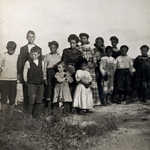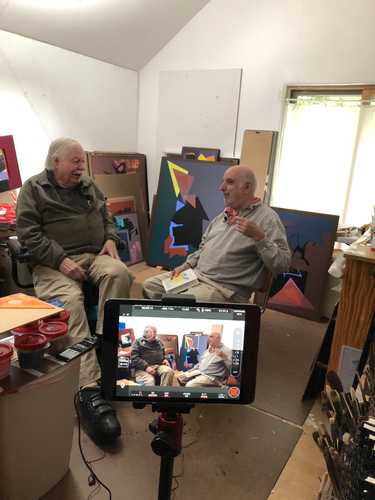Keywords: Listening
Item 22196
Crews of 'Yellow Bird' and 'Green Flash,' Old Orchard, 1929
Contributed by: Old Orchard Beach Historical Society Date: 1929-06-04 Location: Old Orchard Beach Media: Photographic print
Item 7065
Letter regarding Hermann Kotzschmar's music, ca. 1890
Contributed by: Maine Historical Society Date: circa 1890 Location: Portland Media: Ink on paper, manuscript
Exhibit
Fallen Heroes: Last of the Jewish WWII Veterans
Listen to recordings from the last of the World War II Jewish veterans.
Exhibit
"… machines opened up a world of choices for listening to music without leaving the home. Use the navigation tool on the left to explore the…"
Site Page
"… Listen to Chapter Nine The Graveyard Listen to Chapter Ten The Tripp Family Listen to Chapter Eleven Descendant Marnie Voter…"
Site Page
Historic Hallowell - Hallowell Sounds
"The Serenaders Stars Over Stevens ~ Listen to the singers from the Stevens Training Center in a recording from 1966."
Story
Saturday Evening Dances at the Westport Town Hall
by Deborah G. Greenleaf
Fond Memories of Westport Island
Story
William Manning in conversation with Christopher Crosman
by William Manning and Christopher Crosman
A conversation between an artist and art historian
Lesson Plan
Wabanaki Studies: Stewarding Natural Resources
Grade Level: 3-5
Content Area: Science & Engineering, Social Studies
This lesson plan will introduce elementary-grade students to the concepts and importance of Traditional Ecological Knowledge (TEK) and Indigenous Knowledge (IK), taught and understood through oral history to generations of Wabanaki people. Students will engage in discussions about how humans can be stewards of the local ecosystem, and how non-Native Maine citizens can listen to, learn from, and amplify the voices of Wabanaki neighbors to assist in the future of a sustainable environment. Students will learn about Wabanaki artists, teachers, and leaders from the past and present to help contextualize the concepts and ideas in this lesson, and learn about how Wabanaki youth are carrying tradition forward into the future.
Lesson Plan
Maine's Acadian Community: "Evangeline," Le Grand Dérangement, and Cultural Survival
Grade Level: 9-12
Content Area: English Language Arts, Social Studies
This lesson plan will introduce students to the history of the forced expulsion of thousands of people from Acadia, the Romantic look back at the tragedy in Henry Wadsworth Longfellow's famous epic poem Evangeline and the heroine's adoption as an Acadian cultural figure, and Maine's Acadian community today, along with their relations with Acadian New Brunswick and Nova Scotia residents and others in the Acadian Diaspora. Students will read and discuss primary documents, compare and contrast Le Grand Dérangement to other forced expulsions in Maine history and discuss the significance of cultural survival amidst hardships brought on by treaties, wars, and legislation.















